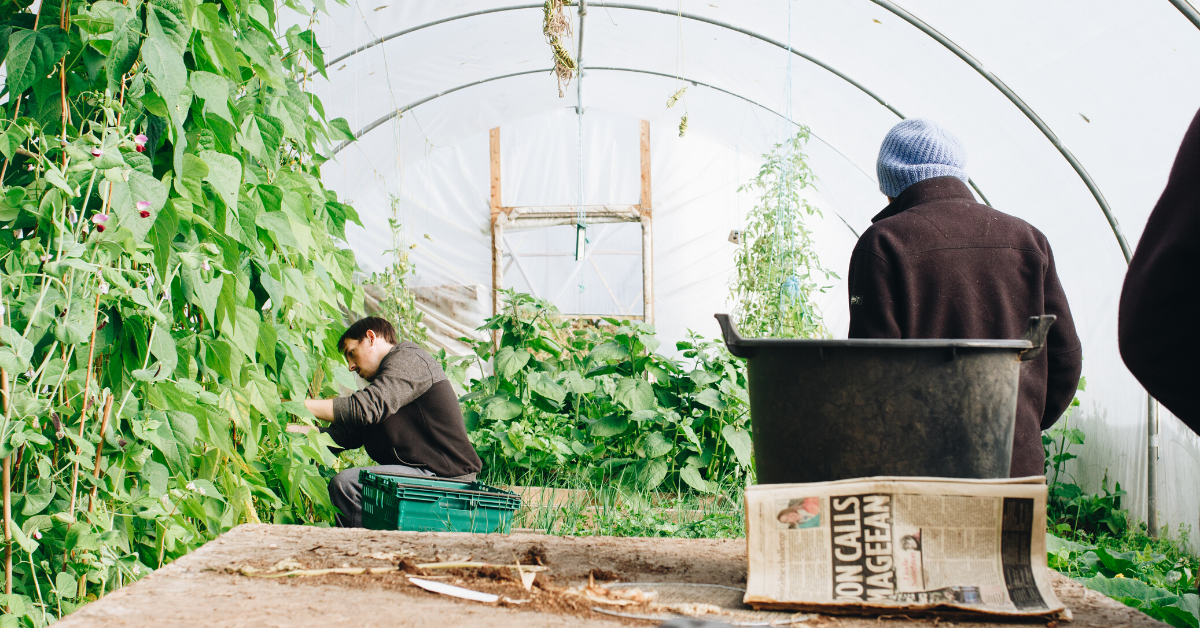Continue readingHammering it home! Organic is good for health
“I think, therefore I farm organically” – and wholistically

WHAg Window – giving a view from our perspective…..
You don’t have to be an organic farmer to farm for health but organic farming and biodynamic farming are the only farming systems which are built on a concept of health – in principle and in practice. “Regenerative” isn’t, nor is agroecology, or “agricology”, nor “pasture fed, or “holistic grazing” and nor are the various versions of “nature-friendly farming”.
All of these approaches have things to commend them – some more than others – and the farmers following these methods should be given credit for breaking out of the conventional mould. These approaches are all concerned with some aspect/s of health on which they focus, which is why organic farmers are often – if not always – involved in them.
But they are not systemically built on an underpinning and overarching concept of health which determines how the whole farm is managed from soil, to plant and to livestock and then how the product of that farm is harvested, stored, processed, packaged and sold. All with the aim of securing and enhancing the process of positive health in all of those phases – and in the surrounding ecosystems.
The organic farming vision – ambitious, preposterous and real
This aim is so ambitious that it is almost guaranteed to fail, and in truth there are some poor examples of organic farms in all parts of the world. But there are far more good ones than there are poor ones.
Some might say that this ambitious aim became a preposterous one when organic ideas began to spread and sought to take root in a wide range of ecosystems and social conditions around the world. But organic farming is found thriving in far more countries, in all parts of the world, than not – and in most of them it has been grown from the grassroots by an alliance of farmers and citizen consumers.
Others have argued that this ambitious and preposterous aim became well-nigh impossible when the organic movement began to evolve into an organic sector and became involved in a regulated global market.
And in part they may be right because there are examples of dire regulation which shame the organic vision and concept but there are also good examples, in many parts of the world, where regulated organic production provides consumers with healthy food they can trust, gives farmers a consistent and reliable market and the confidence to seek to farm for health.
Whatever its problems, downsides and challenges no other farming system – conventional or alternative – provides systemic positive health in soils, in plants, in animals, in the food produced, and in the environment and ecosystems in which it is based in a consistent, wide-ranging way across the globe. It is no accident that whenever “sustainability” of farming, or the quality of food, or the value of farming methods for health of soil and livestock are assessed, it is organic farming which is always referenced.
Celebrating organic farming
So, whilst we at Whole Health Agriculture recognise the challenges facing the organic sector and are aware of the benefits of other farming systems and are conscious of the skills of many non-organic farmers, we strongly believe that we should celebrate organic farming during this “Organic September” – and every other month of the year.
Here’s why:
Organic farming is built on the concept that the health of soil, plant, animal and man is one and indivisible. This is the truly wholistic concept of the process of positive health management which we believe is the basis of whole health agriculture. This concept is at the heart of the organic principles (health, ecology, care, fairness) from which day-to-day practices flow.
In practice, organic farms have for decades been delivering demonstrable benefits all around the world to the farmed environment, wildlife and biodiversity, livestock, food quality and health. Faced with the problems of climate change and finite resources, biodiversity loss and pesticide and diet related ill-health it is clear that organic farming can make a massive contribution to tackling these problems.
Although research evidence is hard to gather in complex living systems the evidence for the benefits of organic farming is now mounting to the point where it is hard for even the most critical commentator to dismiss it. One of the heartening things about this Organic September is the positive tone with which the media has generally responded.
Thinking about the farm as more than a collection of enterprises
Of course, there is still a good deal of misinformation around, from both pro and anti-organic commentators – and especially over questions of soil, food quality and health. We will pick up on some of these things in the future.
Over the years I have known many organic farmers and organic farms. I have watched closely and supported conventional farmers in their conversion to organic systems and in their journey of discovery about the intricacies of organic farming and whole farm health. Almost all of them have found this journey satisfying and would never return to farming conventionally.
One of them, the late Ed Goff – a conventional dairy farmer who started his conversion to organic farming in the mid-1980s – was adamant that he would never return to conventional farming. When asked why not, he paraphrased the philosopher Descartes in reply, “I think, therefore I farm organically”.
That is not to suggest that conventional farmers don’t think. What Ed meant, was that when you begin to see how the process of health is enhanced in whole farm systems, you begin to think through how to manage that farm as a whole and not as a collection of enterprises. You start to think wholistically (not that he would ever use the term) and organically.
Lawrence Woodward

About the Author: I’m the chairman of WHAg, founder and director of the Organic Research Centre (ORC), and regularly advise & speak about the principles and methods of organic agriculture.
The Bumpy Road to Success
Here’s why I’m so at odds with most of my ‘green’ friends
Continue readingHere’s why I’m so at odds with most of my ‘green’ friends
Whole farm and organic systems are being ignored in post Brexit farm support plans

WHAg Window – giving a view from our perspective…..
The Agriculture Bill currently moving through Parliament is supposed to lead to a new farm support scheme based on the idea of paying “public money for public goods”.
This approach will replace the EU’s Common Agriculture Policy where farmers’ income is supported by the taxpayer – in some cases up to 60% of farm income.
Health though isn’t included and neither, as thing stand, are whole farm and organic systems – at least not in England.
Scotland and Wales get it but not England
Possibly farming for health is too difficult an idea for policy makers and officials to grasp at the moment, but the fact that organic farms are excellent at delivering “non-market goods and services” such as biodiversity, soil protection, flood protection, habitats and landscape is well established, so why is this not being recognised?
It’s not even a novel idea. Organic farming has benefited from its own distinct arrangements in all the farm support schemes, in all parts of the UK, since the middle of the 1990s. The organic option under the most recent scheme (Countryside Stewardship) is generally recognised as a success.
All the indications are that Scotland and Wales will have organic payment schemes which will encompass a whole farm approach but in England, Defra seems, at the moment, to be perversely set against the idea.
The whole farm system approach optimises public goods delivery
WHAg is a member of the English Organic Forum (EOF) which has been trying to get the government to include an organic and whole farm component in the scheme. To date, the efforts have been made behind the scenes but such is our mounting concern that we “went public” with a press release on the back of a National Trust report on the success of its in-house managed organic farm on the Wimpole Estate.
Commenting on the commercial and environmental success there, EOF chair, Christopher Stopes said that the story of Wimpole highlighted that it is the “whole system approach which brings production, ecology and environment together in a way which optimises food production alongside the delivery of public goods.”
At the present Defra’s Environmental Land Management Scheme (ELMS), the chosen vehicle for the new payment scheme, is built on three tiers with tier 1 focussing on production balanced by “public goods” delivered through a menu of individual techniques which farmers can take up as they choose. These have limited relationships to each other and do not form any coherent whole.
Bypassing whole farm health
As Stopes says, “The whole farm system approach is critical and we are deeply concerned that this is being overlooked by Defra.”
At WHAg we are keenly aware that it is not just organic farmers who follow a whole health approach to farming. Farmers who use conventional inputs do this too. The key thing is to manage the farm as a coherent, whole system. Experience over the years has shown that this is the best way of achieving health.
Unless Defra changes tack, what has been called a “once in a generation chance” to change how we farm is going to bypass supporting whole farm health – at least in England.
Meg’s Musings – Fiercely on the Farmers’ Side
Continue reading "Meg’s Musings – Fiercely on the Farmers’ Side"






